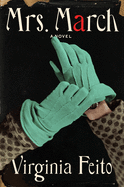
If Virginia Feito's Mrs. March were a film, it would be called highly stylized, so deliciously drenched is it with the signifiers of an upscale Manhattan of decades past. The novel's cinematic aspect has also been noted by Elisabeth Moss, who is slated to produce and star in a film adaptation.
Mrs. March, a housewife and mother--referred to by her married name throughout the novel--resides on Manhattan's Upper East Side. She's married to George, a college professor turned novelist whose latest book is the talk of the town. The manager of a shop that Mrs. March frequents asks her, "Isn't this the first time he's based a character on you?... I could be wrong, of course, but... you're both so alike...." Mrs. March hasn't yet read George's new novel but knows that its protagonist is a long-in-the-tooth prostitute.
While poking around in George's study, Mrs. March spies a news clipping peeking out from one of his notebooks, its headline "Sylvia Gibbler still missing, presumed dead." Mrs. March has heard about this young woman from Maine: her disappearance from her hometown has been in the news. Mrs. March concludes that George is using the article for research, but when she gets an update on the Gibbler story, a seed of doubt takes root.
The earliest pages of Mrs. March suggest that Feito has committed to a straight-ahead retro thriller of old New York, but gradually, Mrs. March becomes something more than an amateur sleuth: she doubles as the novel's subject. Mrs. March is window-dressed to perfection as a psychological thriller-cum-cosmopolitan grotesque. --Nell Beram, author and freelance writer

